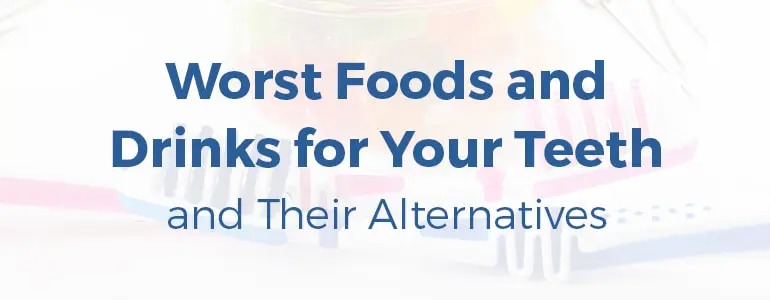
If you’re asking yourself which foods are the healthiest for you, you’re probably already aware that your diet plays a huge role in maintaining your energy level and weight. The healthy nutrients in a good-for-you diet help keep your bodily functions running efficiently and fighting disease.
But do you know the foods that are good for your teeth, or what drinks cause cavities? That’s right — certain foods and beverages may also impact the health of your mouth and teeth. Many foods and drinks can lead to more plaque and damaged teeth. Learning what to eat to prevent tooth decay can help keep your teeth from decaying.
According to the American Dental Association (ADA), if you have a poor diet lacking nutrition, you’ll often see the first signs in your mouth.
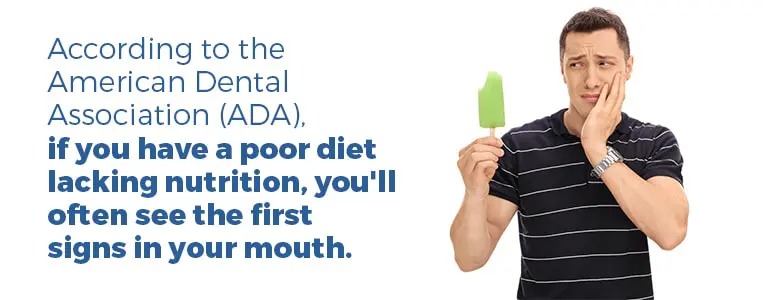
Below we go over the worst foods and drinks for your teeth — and what you can put in their place as alternatives.
Plaque is a sticky, bacterial film contributing to tooth decay and gum disease. After eating the worst foods for teeth, acids released from plaque begin attacking the enamel (outer layer of the tooth). Cavities may occur as your enamel breaks down.
Statistics from the Centers for Disease Control and Prevention (CDC) show cavities are most common in individuals between the ages of 6 and 19. They can lead to complications like:
When you don’t brush your teeth and floss, it will cause the plaque on your teeth to harden and form tartar. When you have tartar above your gum line, it may result in gingivitis, which is the beginning of gum disease.
Having a pleasant smile and avoiding cavities aren’t the only things that promote good oral health. Poor oral health, particularly if you have gum disease, has a possible association with heart disease, the American Dental Association reports. Additionally, when your mouth tissue and gums become infected, it puts a strain on your immune system and your body.
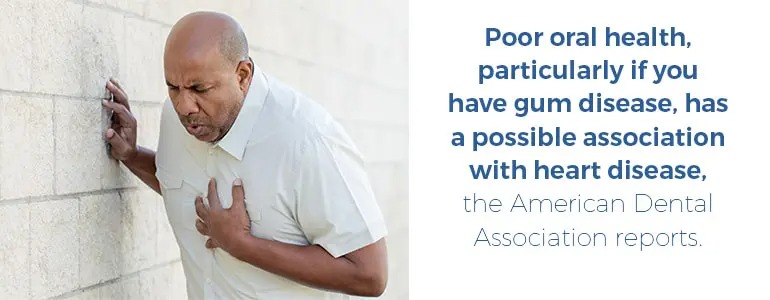
When your diet lacks necessary nutrition, it becomes harder for your mouth tissues to resist infection, contributing to periodontal disease. Periodontal disease is the leading cause of adults losing their teeth. While poor nutrition isn’t the direct cause of this disease, many researchers think in individuals with nutrient-poor diets, the disease can be more severe and progress faster than in those with nutrient-abundant diets.
When you consume sugary and starchy foods, not only are you nourishing yourself, but you’re also feeding the plaque-causing bacteria on your teeth. When starches or sugars attach to the plaque in your mouth, the resulting acids begin attacking your teeth even after you’ve been done eating for 20 minutes. Each sip of a sugary drink or mouthful of food starts this 20-minute cycle all over.
As these attacks continue, the hard enamel on your teeth’s surface breaks down, leading to tooth decay. The bacteria-filled plaque may also break down teeth-supporting bone, gums and other structures in the mouth by triggering an inflammatory response.
So what food causes the most plaque? Read on to find out the worst foods — and their alternatives.
Some of the least healthy foods and beverages you consume are harmful to your teeth, include the following:
Little good comes from drinking soda — especially for your weight if it’s not the diet variety. In addition, soda is one of the worst drinks for healthy teeth. Pop causes plaque to make more enamel-attacking acid. According to a study published by the National Institutes of Health (NIH), abusing carbonated soda causes dental erosion that’s just as bad as that which illicit drugs like crack cocaine and meth cause.
Dark-colored sodas may stain or discolor your teeth. Caramel dye produces the deep brown color in pop, which weakens your enamel and contributes to teeth yellowing. When you have weak enamel, your teeth are easier to stain.
Bacteria and the sugar in soda combine in your mouth and produce acid. Even “sugar-free” and diet pops produce corrosive destruction. The acid damages your teeth by dissolving your enamel. Each time you take a sip of soda, you’re starting a whole new 20-minute acid attack cycle. These repeated attacks weaken your enamel.
Soda doesn’t just affect your tooth enamel — it even impacts the dentin, or next layer, and composite fillings inside cavities.
Diet soda contains phosphoric and citric acid, and regular soda is loaded with sugar — more than ten teaspoons in some varieties. Both provide the bad bacteria in your mouth with a sugar feast. The bacteria causes plaque buildup leading to gum disease.
While delicious and light as air, potato chips have a texture to them which turns “gummy” after chewing. The resulting substance lingers in your mouth. Chips are starchy and get stuck in your teeth, causing the acid-producing bacteria responsible for attacking your teeth and increasing your risk of tooth decay.
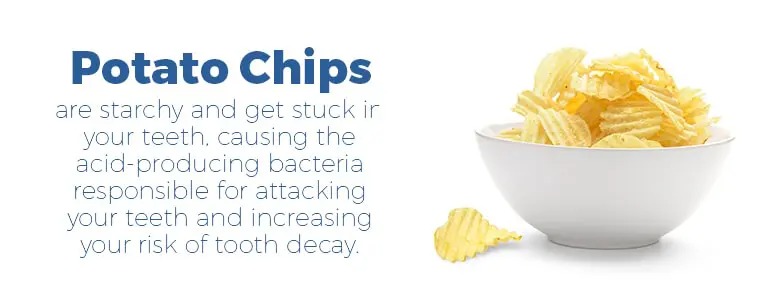
Most types of potato chips aren’t known to stain your teeth.
The starch in potato chips turn into sugar and gets trapped in between your teeth to feed plaque and bacteria. Since you probably don’t stop at one chip, you’re adding to the lasting acid production and again promoting tooth decay.
Potato chips, being starchy, can dry out your mouth. Saliva keeps food from getting stuck on your teeth. Saliva also helps repair early signs of gum disease, tooth decay, and other oral infections. However, when your mouth becomes dry, it lowers your saliva level and keeps saliva from doing its job.
Citrus is an acidic food which may erode enamel and over time make your teeth more vulnerable to decay. Repeated exposures to acidic foods can erode enamel, making your teeth more susceptible to decay over time. That means even though the squeeze of a lemon wedge can turn a glass of water into a tasty beverage, it’s not always the best option for your mouth. Citric fruits and juices can also irritate mouth sores.
If your teeth have a yellowish tinge, citrus fruits and other acidic foods could be to blame. Although healthy for you, if you eat too many citrus fruits, it can erode your tooth enamel, exposing your yellow-hued dentin.
Lengthy and repeated citric acid exposure can cause your tooth enamel to dissolve. The demineralization of the hard-tooth surface, known as erosion, leads to tooth decay.
Citric juices and fruits are high in acid. Acidic foods may cause irritation and visible sores to your gum line. Consuming too much citrus fruit can lead to recessed gums and canker sores.
Vinegar, known as acetic acid, is used in the pickling process. The high acid in this liquid wears away your tooth enamel.
Yes, pickles can stain your teeth. The acid in vinegar, essential to the pickling process, wears away at the enamel of your teeth and causes staining.
There’s high acid content in pickled foods due to the vinegar, and they may demineralize your teeth. Also, there’s sugar in pickles — therefore, they contribute to cavities.
High acidic foods like pickles can cause your gums to recede. To keep your gums and teeth protected, limit the number of pickles you eat.
Coffee assists mouth bacteria in creating acids that result in enamel and tooth erosion, causing your teeth to become brittle and thin.
If it can stain your clothes, it can stain your teeth. There are tannins in coffee, which cause color compounds to stick to teeth more readily and leave a yellow hue behind.
The tannic acids do more damage to your teeth than simply staining them. These acids can break your tooth enamel down and cause decay.
Coffee may cause halitosis (bad breath) since it gets stuck to your tongue. It also dries out your mouth, keeping your saliva from repairing the early signs of tooth decay, gum disease, or oral infections as described above.
Sports drinks contain acids and sugar, causing the potential for erosion and cavities.
Sports drinks can stain your teeth due to the brightly-colored dye that they contain.
The sugar in sports drinks stick to your teeth more than your saliva does, and this gives the oral bacteria more acid, leading to a higher risk of tooth decay. Mark Wolff of the New York University College of Dentistry and his team dunked cow teeth in sports drinks for one hour. After sixty minutes, they found the cow teeth were softened and had enamel erosion.
The British Journal of Sports Medicine published a study showing sports drinks can cause enamel demineralization due to a low pH value. They can lead to gum disease, infect wisdom teeth, and cause enamel erosion.
While the above foods and drinks are some of the worst culprits for harm to your teeth, others that may loosen fillings, damage orthodontic wires, contribute to tooth erosion and stain teeth include:
The minute you put food or a sip of a drink into your mouth, your saliva goes to work breaking the substance down and preparing your body to digest it. The bacteria in your mouth convert dietary sugar into acids to break down your teeth’s enamel. The more you consume sugary foods and drinks, the more you leave your mouth exposed to decay-causing acids.
So start asking yourself, “What are the best foods for my teeth or best drinks for my teeth?” Read on to find the answer.
Water
Want to know what to drink to prevent tooth decay? Stick with water. Like your saliva, water washes the acid and sugars off your teeth. Water also has fluoride in it. Fluoride is a mineral you find in toothpaste and sometimes mouthwash that protects you against tooth erosion. It naturally occurs in water — most tap water in the U.S. and some bottled spring water.
If you decide to indulge in one of the worst foods or drinks for your teeth, rinse your mouth with water. In some cases, such as with sports drinks, immediately brushing enamel softened by the beverage can cause more harm than good.
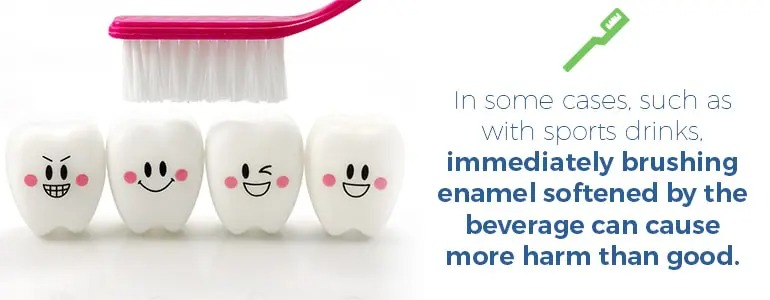
Dairy Products
Milk, plain yogurt, cheese and other dairy products help produce saliva, especially cheese. The calcium in cheese and the phosphates in milk help restore teeth minerals other foods may have caused you to lose.
Green Tea
Green tea has polyphenols in it to interact with the bacteria-induced plaque. They either hold back or kill bacteria, preventing the growth or production of teeth-attacking acid. You may also get some fluoride, depending on the water you brew your tea with. Darker teas, on the other hand, contain tannins, which can cause stains.
Green, Leafy Vegetables
Not only healthy for your body, green, leafy veggies like kale are also good for your teeth. Collard greens, spinach, and other leafy-green vegetables also require you to chew more, which produces more saliva — your teeth’s natural lubricant, tasked with “washing” your teeth.
Foods With Fluoride
Fluoridated water or foods you use fluoridated water to make help your teeth. Some examples are:
These commercially-made foods all provide you with fluoride.
Question: Is there a way to prevent cavities, erosion, and other oral health issues?
Answer: Yes, or at least you can reduce your chances of having these problems. Following these steps:
Question: Is there a way to reverse dental damage?
Answer: Yes, there are various foods that reverse dental damage. You’re probably already consuming these types of foods if you are eating a healthy diet, since some foods like vegetables are naturally good for our teeth as well as our bodies.
Question: Are there any suggestions to help me choose better food choices?
Answer: Yes, definitely. For good dental health, the ADA recommends types of foods to look for when choosing your snacks and meals:
Limit how many snacks you eat. When you do grab a light bite, choose a healthy food like raw vegetables, fruit or cheese.
So, what is the worst thing for your teeth? The answer is consuming the wrong types of food and drinks, and not taking care of your teeth on a daily basis. To maintain good oral health, brush your teeth twice daily using fluoride toothpaste, floss once a day and see us here at AZ Family Dental every six months for a cleaning, checkup and preventive care.